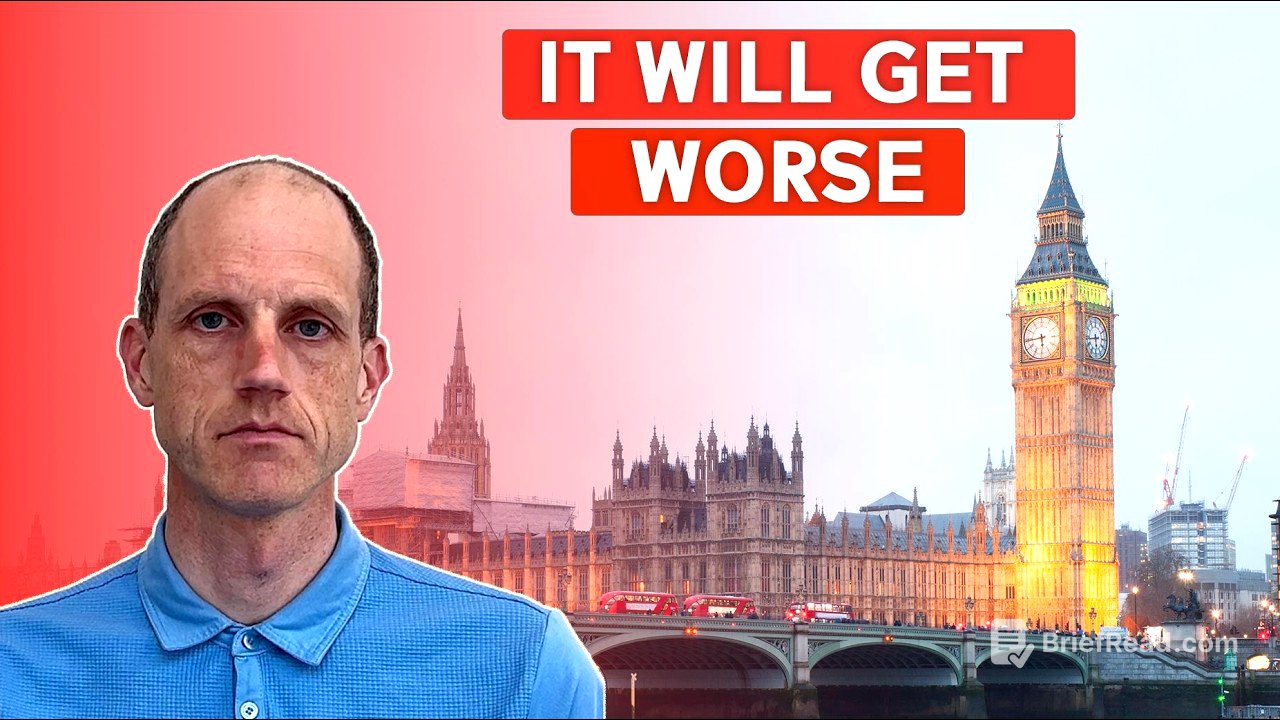TLDR;
The video discusses the current state of the UK economy, highlighting a slowdown in economic growth and productivity since 2009. It addresses issues such as rising borrowing figures, the impact of austerity measures, and the potential threat of a global recession. While there are some positive signs, such as falling oil and gas prices and potential interest rate cuts, significant challenges remain, including the housing crisis, underfunded public services, and an aging population.
- Economic growth and productivity have slowed since 2009.
- Government borrowing is higher than expected, despite record taxes.
- Falling oil and gas prices offer some relief but signal fears of a global recession.
- Local councils face bankruptcy due to rising social care costs.
- The housing crisis persists with unaffordable housing and slow construction rates.
Overview [0:00]
The UK economy is facing significant challenges, with confidence plummeting to record lows due to international turmoil and long-term dissatisfaction. An economic index is at its lowest level since records began, and voters believe that conditions have worsened, particularly regarding roads and hospitals. These issues are linked to poor economic performance since 2009, characterized by a slowdown in economic growth and productivity. Official statistics may be overstating growth, with some data suggesting a decline in GDP per capita.
Borrowing [1:57]
Recent borrowing figures have exceeded expectations, contributing to a sense of fiscal doom. Borrowing was expected to be £87 billion but turned out to be £152 billion. Government concerns about the budget deficit have cast a shadow over the economy, despite record taxes. Unpopular measures, such as changes to inheritance tax for farmers and stricter criteria for personal independence payments, save relatively little money compared to overall government spending. The government's early hard decisions have not significantly altered the deficit's trajectory.
Better News [3:42]
There is some positive news for the economy, as oil and gas prices have fallen by around 15%, potentially making inflation predictions overly pessimistic. UK inflation is looking slightly better than it did a couple of months ago. As a result of lower inflationary expectations, markets now anticipate three to four interest rate cuts this year. Lower interest rates should support households struggling with mortgages and debts, and could also reduce government interest payments.
Global Recession [4:50]
The silver lining of lower inflation has a dark shadow: lower oil and gas prices reflect fears of a global recession due to tariff turmoil. Average US tariffs have risen to levels not seen since the Great Depression. The UK's car industry is particularly vulnerable to these tariffs, with car production already declining since 2017. A continued decline in manufacturing and industrial output, driven by high electricity prices and weak demand, is a significant problem for the UK economy. Brexit has also contributed to a slowdown in trade, with exports of goods lagging behind the rest of the G7.
Local Councils [6:28]
The state of local communities is a pressing issue, with cuts to the police leading to a rise in shoplifting incidents. Courts face a massive backlog since COVID, and there is a shortage of prison places. Low productivity growth is partly due to declining participation rates, with more people moving onto sickness benefits. Despite higher council taxes, 43% of local councils are facing bankruptcy. Councils are legally required to provide special needs education and social care, and as society ages, spending on social care has soared, squeezing other areas like housing services and road maintenance.
Housing Crisis [9:21]
The government aims to build 1.5 million homes to reduce high housing costs, but this will be difficult to achieve. House building fell to just 153,000 last year. Builders cite regulation and a lack of skilled labor as obstacles, and are reluctant to erode profit margins by significantly increasing supply. Government plans to ease planning regulations may help, but there is no guarantee that homes will be built where needed. Immigration has contributed to rising rents and exacerbated the housing crisis, but has also made a net contribution to public finances. Since 2004, migrants have filled 4.5 million new jobs in the UK economy, while domestic employment has risen by only 600,000.
Public Investment [12:35]
The government has tried to increase public sector investment by allowing more borrowing for investment. However, overall investment is still set to fall in a few years, leaving the UK with persistently low levels of investment. UK growth did pick up at the start of 2025, with higher pay increasing household balance sheets. Lower interest rates could boost confidence, and the government budget is slightly expansionary with higher spending on public sector pay and public investment.
Other Problems [13:48]
Even a few years of decent growth may not be enough to significantly improve public services due to years of underfunding. The long-term impact of a rapidly aging population poses a challenge, with the share of the population over 65 increasing. The government may find it difficult to remove the triple lock pension guarantee. Raising the retirement age could be a bolder, more long-term solution to increase employment levels and reduce pension spending.








